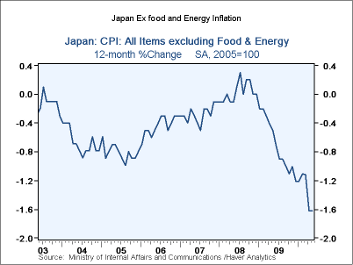 Global| Jun 25 2010
Global| Jun 25 2010Deflation Still Haunts Japan Actively - Its Exports Can't Save It
Summary
D-flation - Japan continues to show the effects of deflation. Prices fell by 0.4% in May, an accelerated drop from -0.1% in each of the last two months. Less food and energy prices fell by 0.2% in May a bigger drop than the -0.1% in [...]
D-flation - Japan continues to show the effects of deflation. Prices fell by 0.4% in May, an accelerated drop from -0.1% in each of the last two months. Less food and energy prices fell by 0.2% in May a bigger drop than the -0.1% in each of the preceding two months.
D-flation gets D-per- Its sequential growth rates show that inflation and core inflation from 12-months to 6-months to 3-months is falling at an increasingly rapid rate. In the quarter to date the CPI is dropping at a 1.4% annual rate and core prices are dropping at a 1.3% pace.
Japan is ambitious to solve other problems despite its D-flation struggle - There is little evidence here that Japan's deflation is diminishing at all. Indeed it is worsening. The chart looks ominously dire. Still, Japan's new Prime Minister wants to tackle Japan's huge debt load. This is sort of like wanting to be Mr Universe while trying to recovery from a severe case of ongoing malnutrition.
Is that all there is... to export prowess? -- Japan for all its export prowess has made compromises in the operation of its economy. Germany, another adept exporter, has structurally high unemployment. China has run its development off of export led growth and has piled up huge foreign exchange reserves instead of letting increasing purchasing power help its people to a better lifestyle. China has been all about controlling the rate of growth and preserving social stability. Export success has not helped these countries to better welfare as much as it has helped to create and international policy mix imbroglio - one that still is festering.
Is it still good if it gives you fever? -- At some point it maybe clear that free trade and export penetration are not goals in and of themselves. When they cease to be corridors to better economic development we should question what we are calling 'free trade' or how export penetration is being achieved. When countries 'do things' to attain export penetration that are not formally illegal under WTO rules but undermine the essence of the open trading system the result is not altogether good. This ort of corner-cutting often shows in the economic results. While all the export-dependent countries bemoan the large US deficits, deficits that are about to spring into full bloom again, they have no one to blame but themselves.
Still they keep on dancing - The life these 'exporter nations' have chosen under the umbrella of free trade is so much worse than it otherwise could be but there is a certain myopia about that. Countries today want to export as a sign of strength the way that they wanted to produce steel in the early post war period as a sign of economic acumen. Until there are more enlightened thoughts about what free trade is, should be, and what its results should look like, we can expect to continue to see a distortion-plagued world trade order. Japan is only one example.
Who is happy to see this? -- We might add, somewhat parenthetically, that while the US (and its deficits) has been so blamed for poor economic management, it has been the trade surplus countries that have been hurt as much or more by the various cycles in the Post War period when theses deficits have cropped up. For all its faults the US has the most open and the least restrictive economic system and for that reason it is best able to recover when things go wrong. It relies on markets more than government; or least it has. For all their exporting acumen Japan has deflation and Germany has structurally high unemployment. How enviable is that? Great job exporting, though.
09
09
09
Robert Brusca
AuthorMore in Author Profile »Robert A. Brusca is Chief Economist of Fact and Opinion Economics, a consulting firm he founded in Manhattan. He has been an economist on Wall Street for over 25 years. He has visited central banking and large institutional clients in over 30 countries in his career as an economist. Mr. Brusca was a Divisional Research Chief at the Federal Reserve Bank of NY (Chief of the International Financial markets Division), a Fed Watcher at Irving Trust and Chief Economist at Nikko Securities International. He is widely quoted and appears in various media. Mr. Brusca holds an MA and Ph.D. in economics from Michigan State University and a BA in Economics from the University of Michigan. His research pursues his strong interests in non aligned policy economics as well as international economics. FAO Economics’ research targets investors to assist them in making better investment decisions in stocks, bonds and in a variety of international assets. The company does not manage money and has no conflicts in giving economic advice.
More Economy in Brief
 Global| Feb 05 2026
Global| Feb 05 2026Charts of the Week: Balanced Policy, Resilient Data and AI Narratives
by:Andrew Cates







